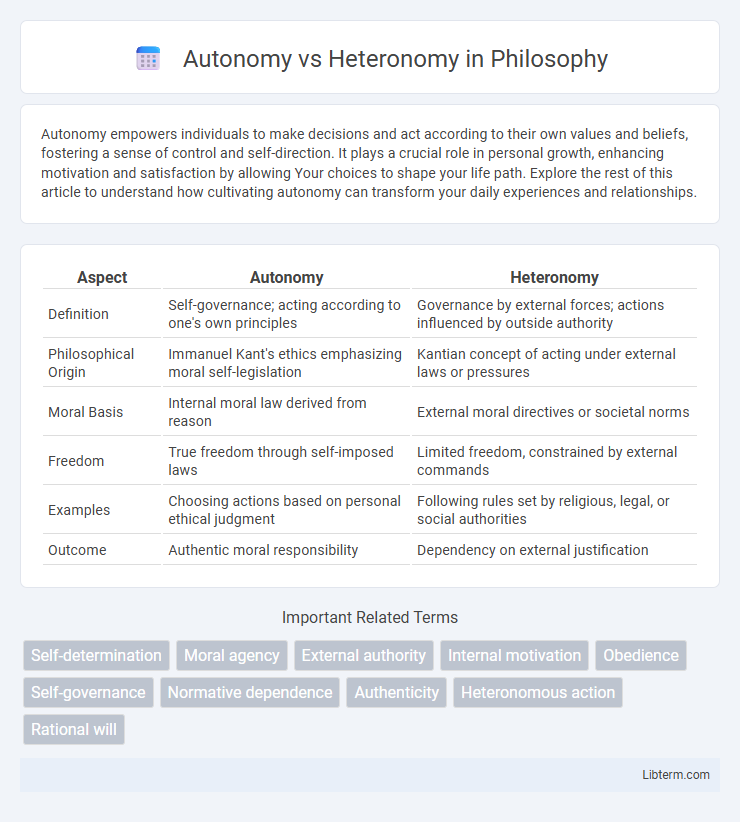Autonomy empowers individuals to make decisions and act according to their own values and beliefs, fostering a sense of control and self-direction. It plays a crucial role in personal growth, enhancing motivation and satisfaction by allowing Your choices to shape your life path. Explore the rest of this article to understand how cultivating autonomy can transform your daily experiences and relationships.
Table of Comparison
| Aspect | Autonomy | Heteronomy |
|---|---|---|
| Definition | Self-governance; acting according to one's own principles | Governance by external forces; actions influenced by outside authority |
| Philosophical Origin | Immanuel Kant's ethics emphasizing moral self-legislation | Kantian concept of acting under external laws or pressures |
| Moral Basis | Internal moral law derived from reason | External moral directives or societal norms |
| Freedom | True freedom through self-imposed laws | Limited freedom, constrained by external commands |
| Examples | Choosing actions based on personal ethical judgment | Following rules set by religious, legal, or social authorities |
| Outcome | Authentic moral responsibility | Dependency on external justification |
Understanding Autonomy: Definition and Key Concepts
Autonomy refers to an individual's capacity for self-governance, characterized by making informed, uncoerced decisions based on personal values and reasoning. Key concepts include self-determination, freedom of choice, and moral responsibility, highlighting an agent's ability to act according to their authentic will. Understanding autonomy involves recognizing the balance between independent judgment and external influences while emphasizing personal accountability in ethical contexts.
Exploring Heteronomy: Meaning and Implications
Heteronomy refers to the condition where an individual's actions and decisions are influenced or determined by external forces, such as societal norms, laws, or authority figures, limiting personal freedom and self-governance. This concept is crucial in ethical and philosophical discussions, highlighting how external control can shape moral responsibility and personal identity. Exploring heteronomy underscores implications for autonomy in legal systems, educational frameworks, and cultural practices, where compliance often supersedes independent choice.
Historical Evolution of Autonomy and Heteronomy
The historical evolution of autonomy and heteronomy reflects shifting philosophical and social paradigms from ancient to modern times, where autonomy emerged as self-governance and moral independence contrasted with heteronomy's external control and imposed norms. Classical Greek philosophy, particularly through figures like Kant, solidified autonomy as the foundation of moral responsibility, opposing the heteronomous influence of societal laws and external authorities. Throughout the Enlightenment and subsequent political revolutions, autonomy gained prominence as a principle of individual freedom and democratic governance, challenging traditional heteronomous structures such as monarchy and religious dogma.
Autonomy vs Heteronomy: Core Differences
Autonomy refers to self-governance where individuals make decisions based on personal values and reasoning, promoting freedom and accountability. Heteronomy involves being governed by external forces or rules imposed by others, leading to compliance without internal motivation. The core difference lies in the source of control: autonomy emphasizes internal agency, while heteronomy depends on external authority.
Psychological Perspectives on Autonomy and Heteronomy
Psychological perspectives on autonomy emphasize the importance of self-determination, where individuals make choices aligned with their intrinsic values, fostering personal growth and well-being. In contrast, heteronomy involves behavior controlled by external influences, such as social pressures or authoritative rules, often leading to decreased motivation and psychological distress. Research in self-determination theory highlights that autonomy-supportive environments enhance cognitive functioning and emotional resilience compared to heteronomous contexts.
Social and Cultural Influences on Individual Autonomy
Social and cultural influences significantly shape individual autonomy by determining the norms, values, and expectations that guide personal decision-making and behavior. In collectivist societies, heteronomy often prevails as community goals and social roles take precedence over individual desires, limiting autonomy in favor of group cohesion. Conversely, individualistic cultures promote autonomy by encouraging self-expression and personal choice, though social pressures and cultural traditions still play a critical role in framing the limits of this freedom.
The Role of Autonomy in Education and Learning
Autonomy in education fosters critical thinking, intrinsic motivation, and personalized learning, enabling students to take ownership of their educational journey. By encouraging self-directed learning and decision-making, autonomy enhances engagement and deeper understanding, leading to improved academic outcomes. Emphasizing autonomy prepares learners to adapt to complex real-world challenges with confidence and creativity.
Heteronomy in Institutions: Power and Authority Dynamics
Heteronomy in institutions manifests through hierarchical power structures where authority is imposed externally, limiting individual autonomy and decision-making. Institutional rules and norms enforce compliance, reinforcing control by dominant groups or leadership to maintain order and stability. These dynamics create environments where power operates top-down, often suppressing dissent and fostering dependence on governing bodies.
Ethical and Moral Dimensions: Autonomy vs Heteronomy
Autonomy in ethics emphasizes an individual's capacity for self-governance and moral reasoning, allowing personal values to guide decision-making independently of external influences. Heteronomy, conversely, refers to moral actions dictated by external authorities or societal norms, limiting personal freedom in ethical judgments. The tension between autonomy and heteronomy highlights crucial debates in moral philosophy regarding the source of ethical legitimacy and the role of individual conscience versus collective rules.
Fostering Autonomy in a Heteronomous Society
Fostering autonomy in a heteronomous society involves empowering individuals to make independent decisions despite prevailing external controls and social norms. Educational initiatives promoting critical thinking and self-reflection are essential for cultivating personal agency and resisting external pressures. Encouraging environments that support diverse viewpoints and respect individual values enhances autonomy while navigating heteronomous constraints.
Autonomy Infographic

 libterm.com
libterm.com